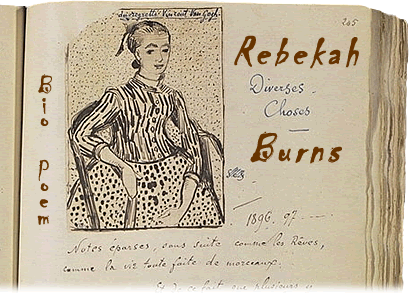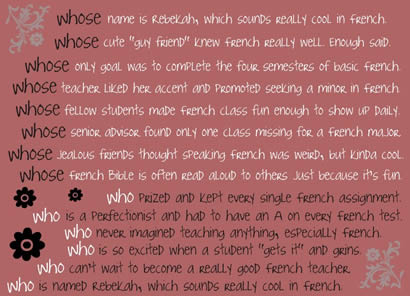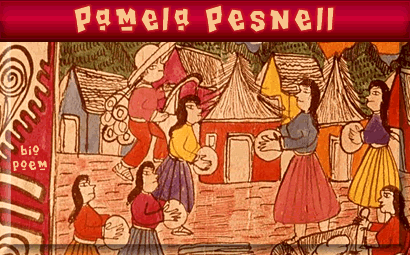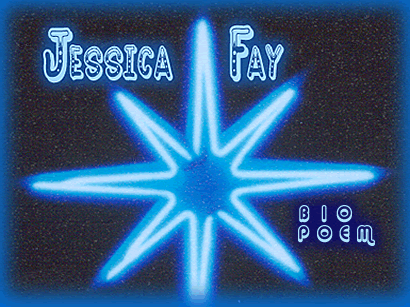|

Assignment:
Writing a
Bio Poem
in the
Target
Language.
August 12, 2011

In A Poetry Handbook (1994), Mary Oliver compares writing a poem to a love affair between the heart and the “learned skills of the conscious mind” (1994, p. 7).
The language of poetry speaks directly to the soul. It also sings to the emotions and appeals to the intellect through the refined nature of word choice and imagery. Heart, mind, and soul merge in the reading of a poem. When we try our hand at writing a poem, the body also becomes a participant.
For classroom teachers, we can easily identify the triumvirate domains of learning — cognitive, affective, and kinesthetic — when we ask students to write a poem. The brain, the heart, and the body participate in creating the writer’s perspective, perception, and point-of-view. Each poem reveals something about the writer. These revelations are tools to guide instruction and connect on a personal level with our students, who tell us that the most important characteristic of an effective teacher is very often their attitude of caring.
Interns in the first semester of their Special Methods of Teaching Foreign Languages course are asked to write a Bio Poem in their target language, the one they will teach. Writing poetry in a different language adds another dimension to the creative process as the writer seeks to find the perfect expression in a second tongue.
The assignment has three goals:
1) to build a learning community. Students read their poems aloud in class and translate for their peers. Listeners can ask questions and make comments about the content of the poems. Writers also have the option of sharing their poems with a world-wide audience here on Planet Gnosis.
2) to assess target language proficiencies. Students give feedback on structure and vocabulary in whole class discussion. They are able to revise and resubmit the assignment if necessary.
3) to allow students to reflect on their own writing challenges and consider how this assignment can be adapted for use in their future classes.
My Master of Arts in Teaching candidates receive a handout in English with a brief description of the assignment and specific directions for the format of the poem. (A copy of the assignment handout is available for download at the end of this article.)
The Bio Poem is an eleven-line creation. It begins with the writer’s first name (their given name) on line one and ends with their last name (their family name) on line eleven. The content consists of nine lines with descriptive adjectives, subordinate clauses, and items in a series.
The Bio Poem assignment can be modified to accommodate beginning language learners by providing them with vocabulary lists and including the subordinate pronouns and appropriate verbs.
The 2011-2012 foreign language interns recently completed the Bio Poem assignment during their first course in Special Methods. Five interns — four in Spanish and one in German — presented their poems in class at the beginning of the summer semester. You are invited to read their creations. The seashell will guide you there . . . .
Reference: A Poetry Handbook: A Prose Guide to Understanding and Writing Poetry by Mary Oliver. Published in 1994 by Harcourt, Inc.

Please click the arrow to download a copy of the assignment handout for "Bio poem in the target language (TL)" from the summer 2010 semester.
Bio Poem assignments from previous years are featured on the rest of the page.
Assignment:
Writing a Bio Poem
a Foreign Language.
Summer Term, 2009
Foreign language candidates in the first semester of the Master of Arts in Teaching Program welcome you to read their Bio Poems, the first assignment of the summer term 2009. The poems are written in the students’ target languages (TLs) of French, German, and Spanish. Students were given the template for the poem in English but were required to write the poem in their target language.
The assignment was designed with several purposes:
• to practice proficiency in the TL with particular emphasis on parts of speech, nouns and adjectives, syntax, relative pronouns, and items in a series
• to build a learning community by sharing the poems in class and on the website
• to connect to the Five C’s of Foreign Language Learning: Communication, Culture, Connections, Comparisons, and Communities
• to connect to Domain A of the Pathwise Classroom Observation Protocol, which is used by mentors and supervisors in the MAT program and required by the Arkansas State Department of Education for a novice teacher’s induction year
• to reflect on how they might adapt this assignment for their students at different levels of instruction.
Students recited their poems in class and provided a translation for their classmates. As a whole class, we focused on form, word choice, and pronunciation. We also discussed effective use of poetry in a foreign language class, how the poem could be adapted for use at different levels of instruction, and how purpose drives instructional design.
After the presentation and review, students were given the opportunity to revise their poems for submission and assessment. You can read the collected poems by clicking on the text below.
Assignment:
"Why I Decided to Teach
in the Target Language."
Creating a classroom environment where students feel welcome and part of a family group should be a priority for teacher educators. Especially in foreign language learning, students may experience apprehension and discomfort when they discover how difficult it is to express themselves in another language.
Oral proficiency (speaking) is a critical component of language learning, so students must practice the target language daily. Language educators speak of a "high affective filter" when students are shy and reluctant to produce the language. We go to great lengths to keep this filter low. If they can enter a classroom where the environment is comfortable and respectful, students will have a tendency to perform better.
To alleviate anxiety in my classroom, I like to spend a couple of periods getting to know my students and giving them opportunities to get to know each other. On the surface, this may appear to be common sense, but it also ties in to one of the Pathwise domains.
Pathwise is a protocol for assessing teacher performance in the M.A.T. program here at the University. It is also the protocol for assessing novice teachers in public schools in Arkansas. So when I teach, I also attempt to model the Pathwise criteria for my students.
In Pathwise Domain A, Organizing Content Knowledge for Student Learning, the first criterion addresses the importance of becoming familiar with students' background knowledge and experience. This is just another way of saying, "It's good teaching." By knowing our students, we can plan lessons and create learning opportunities that are attuned to our students' experiences.
The Bio Poems activity helps me to learn more about my students. When published and presented to the class, the poems help students get to know one another in ways that build a learning community.
Because I am a poetry aficionado, I often choose activities that are grounded in this delightful, succinct form of expression. In teacher education, these activities serve as models for my student teachers to adapt or incorporate into their own primary or secondary classroom toolkit. They also provide valuable information to help me adapt my learning goals to the needs and talents of my students in the university classroom.
I usually introduce "Bio Poems" on the first day of class. To model the activity, I provide students with my own Bio Poem, which helps them grasp the concept and the form. I like to tweak the lesson for each new class, which keeps it dynamic and fresh for me. Teachers are advised to avoid letting a favorite lesson fall into stasis. Times change, students change, and the dymanics of classroom teaching change from season to season. Keep your favorite lessons attuned to the times.
In that light, the Bio Poem assignment for my three Special Methods students this fall (2008) is based on a 14-line format featuring an octave and a sestet. It's modeled loosely on the Italian sonnet sans rhyme and meter. Rebekah, Pamela, and Monica wrote wonderful poems, which are featured below.
You can see the evolution of the lesson by comparing this year's efforts to the Bio Poems created by my Special Methods students from the class of 2007-2008. The fundamental premise was the same: Students were directed to write their Bio Poem about why they decided to become language teachers. The pattern, however, was slightly different. They were directed to write an adjective clause for each description and connect each clause with the relative pronoun "who" or the possessive pronoun "whose." I did not prescribe a specific number of clauses.
M.A.T. cohorts in my Classroom Management Concepts (CMC) course also write Bio Poems. For fall 2007, I intentionally omitted detailed guidelines in the spirit of creativity. This fall's CMC class followed specific guidelines tied to the mock Italian sonnet. You can read the Bio Poems they created elsewhere on Planet Gnosis by following these links:
 CMC Bio Poems Fall 2008 CMC Bio Poems Fall 2008
 CMC Bio Poems Fall 2007 CMC Bio Poems Fall 2007
Thanks, Rebekah, Pamela, and Monica, for the excellent poems you've created this fall. May they serve as models for students in classrooms everywhere.
Rebekah
Whose name is Rebekah, which sounds really cool
in French.
Whose cute “guy friend” knew French really well.
Enough said.
Whose only goal was to complete the four semesters
of basic French.
Whose teacher liked her accent and promoted seeking
a minor in French.
Whose fellow students made French class fun enough
to show up daily.
Whose senior advisor found only one class missing
for a French major.
Whose jealous friends thought speaking French was
weird, but kinda cool.
Whose French Bible is often read aloud to others just
because it’s fun.
Who prized and kept every single French assignment.
Who is a perfectionist and had to have an A on every
French test.
Who never imagined teaching anything, especially French.
Who is so excited when a student “gets it” and grins.
Who can’t wait to become a really good French teacher.
Who is named Rebekah, which sounds really cool in French.
Burns
September 11, 2008
NOTE: Rebekah took the extra step of creating a poster to display her Bio Poem, which is displayed below. To see a larger version of the poster, please click the image.
Pamela
Whose Grandmother, Grandfather, Father, and Uncle
lived in Argentina in the 60s
Whose 95-year-old grandmother still remembers some
Spanish she learned in the 60s
Whose mother speaks enough Spanish to communicate
with patients and the cleaning lady
Whose father tries to speak Spanish, but is really just
speaking English with a funny accent
Whose first trip to a Spanish speaking country was on
a soccer trip
Whose first experience getting lost on a bus in Mexico
was scary but funny
Whose height had never been average until she lived
in Honduras
Whose passion for Spanish is hard to put into words
Who took Spanish in high school because she had to
Who went to Honduras on her first mission trip and
began a true interest in learning Spanish
Who once dyed her hair brown to look more Latina
Who went to Costa Rica and became part Tica
Who loves working with Spanish speakers because it
takes her to a place, culture, and people she loves
Who desires to encourage Spanish speaking children
in America to reach their dreams
Pesnell
September 11, 2008
Monica
Whose childhood dream was to be a flight attendant
and travel the world
Whose guidance counselor suggested that learning
a foreign language would help her realize her dream
Whose talent for learning languages was discovered
when she took Spanish in seventh grade and then
French in ninth grade
Whose Spanish and French teachers were inspiring
and made classes fun and exciting
Whose lack of self-esteem and doubt deterred her
from taking on a leadership role for many years
Whose career “aha” moment happened when her
youngest son entered kindergarten and she became
a substitute teacher
Whose husband encouraged her to go back to school
and get her masters degree and certification
Whose ambition in life is to inspire others
Who loves working with students of all ages but finds
her passion in teaching Spanish
Who has traveled to many countries but has not lived
outside the United States
Who believes it is never too late to pursue your dreams
Who enjoys seeing her students learning
Who will never stop encouraging her students to be
all that they can be
Who has realized her desire in life is to.... Teach Spanish
Akers
September 15, 2008
Lauren
Whose great grandmother came from Nantes, France, and settled in New Orleans, Louisiana....
Whose grandmother understood French but was punished in school by having to kneel on corn for speaking French, and therefore lost her oral fluency....
Whose mother knows only a few French words: sacrebleu, coo-yon (Cajun for foolish from the French word couillon), and ma mere (French for my mother, what she called her grandmother)....
Who grew up during a French renaissance in Louisiana and began learning French in third grade....
Who hated school after her elementary years until she entered Madame Lancon's French classroom in seventh grade, where she finally met a highly qualified and inspiring teacher who overflowed with love and enthusiasm....
Whose teacher's love of culture and learning fueled her passion to learn the language that closed-minded people forced her family to forget....
Who stopped studying French in the tenth grade after having a teacher who hated French and students....
Whose love for French rekindled in college after studying abroad in Belgium....
Who realized a dream of visiting the land of her ancestors when she became an "Assistante Anglais" in the suburbs of Paris for two years....
Who desperately desires to eliminate ethnocentrism in America by encouraging students to cherish cultural differences through studying French....
Who can't wait to lead others on an exciting journey of the Francophone world....
Who is on a mission to create as many lovers of French and learning as possible in her lifetime.
Marston
November 4, 2007
Jessica
Whose maternal side of the family hails from a royal line from Barcelona, the beautiful capital of Catalonia in Spain....
Whose family had to flee to Colombia to escape the dictatorship of Primo de Rivera....
Whose grandparents met in Colombia, the land of her mother....
Whose mother married an American man, moved to the United States, and had to learn English....
Who never had the opportunity to learn Spanish because her mother refused to speak Spanish to her children so that they would become fully immersed in only the American culture....
Who was introduced to the Spanish language during elementary school in her private school in Florida....
Who continued her studies in Spanish due to her eagerness to capture the part of her heritage that she did not know....
Who had the chance to travel to Spain during high school, further drawing her into the language study....
Who excelled at the language in high school and later college, and even resented the mediocre teachers who stunted her journey into the language....
Who studied abroad in both Mexico and Spain, giving her the opportunity to see the world, teach English, and improve her Spanish....
Who started to think and dream in Spanish and knew she had finally tapped into the part of herself she had always been missing....
Who wanted to share her joy of the Spanish language with others....
Who changed her major from biochemistry to Spanish and Latin American Studies to become like one of the teachers she had loved so much.
Fay
September 26, 2007
Megan
Who began her Spanish studies as a naïve ninth grader looking to fulfill elective requirements....
Who was pleasantly surprised with her enjoyment and success in the class....
Who continued with the language throughout high school and into college at the University of Arkansas....
Who, after one semester as an Interior Design major, changed her major to Spanish as it was the only one thing she truly enjoyed and wanted to learn more about....
Whose interest and enjoyment with the language and culture continued to grow with every course completed....
Who surprised everyone, including herself, when she decided uncharacteristically to take off and experience the Spanish culture first-hand....
Whose time spent living abroad exposed her to so much more than she could have ever hoped for....
Who returned to Arkansas eager to share with everyone her experiences from the diverse and lands of Spain....
Whose experiences and studies have contributed to a genuine interest and respect of the Spanish language and the various cultures and peoples that speak it....
Who enjoys nothing more than sharing this passion of hers with others in hopes that it may spark some of the same understanding and interest in them.
Murry
October 9, 2007
Another point miscomprehended by people who are clumsy at languages is that one does not need to learn a whole language in order to understand some one or some dozen poems. It is often enough to understand thoroughly the poem, and every one of the few dozen or few hundred words that compose it.
— Ezra Pound, "How to Read," 1929
Planet Gnosis is directed by Dr. Freddie A. Bowles,
Assistant Professor of Foreign Language Education
in the Department of Curriculum and Instruction,
the University of Arkansas at Fayetteville.
Planet Gnosis is dedicated
to the exploration of education and teaching.
It is a cybersite of CornDancer.com,
a developmental web for the Mind and Spirit.
Submissions are invited.
|
|















